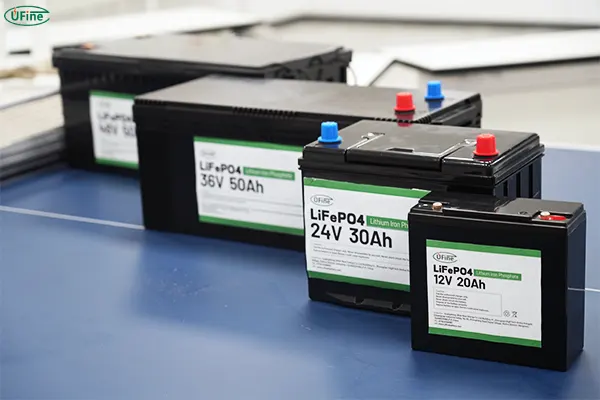In this guide, we’ll dive into everything you need to know about 6-volt golf cart batteries, from understanding their size and chemistry to exploring the pros and cons of different battery types. We’ll also provide practical advice on how to buy, how to maintain, and how long these batteries last. Whether you’re a seasoned golf cart user or a first-time buyer, this guide will help you make an informed decision.
Part 1. Different golf cart battery voltages
When shopping for a golf cart battery, you’ll come across several voltage options. The most common ones are 6V, 8V, and 12V, but what exactly do these numbers mean? And how do they affect your golf cart’s performance?
-
6 Volt Batteries: These are the most common in older or more traditional golf carts. A 6V battery is typically connected in series to form a 36V system (using six 6V batteries) or a 48V system (using eight 6V batteries). The 6V battery is chosen for its ability to provide better torque (perfect for climbing hills) and longevity.
-
8 Volt Batteries: These batteries are a middle ground. They offer a better performance balance than 6V batteries while still being fairly affordable. 8V batteries are typically used in 48V systems.
-
12 Volt Batteries: More commonly used in newer models, 12V batteries allow for better overall performance. They provide quicker acceleration, but they’re usually more expensive than 6V and 8V options.
Each voltage has its strengths. If you need higher speed and better acceleration, 12V or 8V might be better. But if you’re looking for long-lasting power with excellent torque, 6V batteries might be the perfect match.
Part 2. How does voltage affect your golf cart performance?
Voltage plays a significant role in determining the performance of your golf cart. Simply put, higher voltage = more power. But there’s more to it.
-
Higher Voltage Systems (8V or 12V): These are ideal for users who want a faster, more responsive golf cart. If you often find yourself navigating hilly terrain or using the cart for longer distances, a higher voltage system like 48V or 72V will give you more power. You’ll experience better speed, acceleration, and hill-climbing ability.
-
6 Volt Systems: Although 6V batteries might not offer the same raw speed as their higher-voltage counterparts, they excel in providing better torque. For users who need the power to climb steep slopes or carry heavier loads, 6V batteries perform exceptionally well.
Another benefit of 6V batteries is their longer cycle life. They tend to last longer and are typically more affordable than higher voltage batteries in the long run. So, if you have a standard golf cart and use it on relatively flat terrain, 6V batteries could be the optimal choice.
Part 3. Different chemistry 6v golf cart batteries
The chemistry of a 6V golf cart battery determines how efficiently it works, how long it lasts, and how easy it is to maintain. Generally, you will encounter two types of battery chemistries in golf carts: lead-acid and lithium-ion.
Lead-Acid Batteries:
- Types: Lead-acid batteries come in two main types – Flooded and Sealed (AGM and Gel).
- Flooded Lead-Acid Batteries: These are the most traditional and affordable option. However, they require regular maintenance, such as checking water levels and ensuring the battery is properly charged.
- Sealed Lead-Acid Batteries: These batteries are maintenance-free. They are sealed and often come in AGM (Absorbent Glass Mat) or Gel form. AGM and Gel batteries last longer and are less prone to leakage.
Lithium-Ion Batteries:
- High Efficiency: Lithium-ion batteries offer greater energy density, meaning they can store more energy in a smaller, lighter package.
- Longer Lifespan: Unlike lead-acid batteries, lithium-ion batteries can last up to 3-4 times longer.
- Maintenance-Free: Lithium-ion batteries require no maintenance, making them more convenient.
- Cost: They are typically more expensive than lead-acid batteries, but they save money in the long run due to their longevity and lower maintenance costs.
AGM VS Lithium VS Lead-Acid Battery: Comprehensive Comparison
Part 4. Are 6 volt golf cart lithium batteries worth it?
The question of whether 6V lithium-ion batteries are worth the investment depends on your needs. Let’s break down the pros and cons:
Pros:
- Longer Life: Lithium-ion batteries last much longer than lead-acid batteries, with a lifespan of 8-10 years.
- Faster Charging: They charge faster, reducing downtime.
- Lightweight: Lithium-ion batteries are lighter, which means less strain on your golf cart’s motor.
- Low Maintenance: No water checking or terminal cleaning required.
Cons:
- High Initial Cost: Lithium-ion batteries cost more upfront, which might not be feasible for everyone.
- Compatibility Issues: Some older golf carts may not be compatible with lithium-ion batteries without modifications.
Ultimately, 6V lithium-ion batteries are a great investment if you want long-term performance, minimal maintenance, and faster charging. But if you’re on a tight budget or have an older cart, a lead-acid battery might be the better option.
Lithium Golf Cart Batteries vs. Deep Cycle Batteries: Which Is Better?
Part 5. Key considerations when buying 6v golf cart batteries
When it comes to purchasing the right 6V golf cart battery, there are several factors you should consider:
- Battery Type (Lead-Acid vs. Lithium-Ion): Are you looking for a budget-friendly option or a long-term investment?
- Capacity (Amp-Hours): Look for a battery that provides the right capacity to support your cart’s usage needs.
- Charging Time: How long does it take for the battery to charge? Faster charging times are often a plus.
- Lifespan: Consider how long the battery lasts before it needs to be replaced.
- Warranty: A good warranty can save you money in case something goes wrong.
- Maintenance: If you prefer low-maintenance options, consider lithium-ion batteries.
- Price: Always balance the price with the battery’s performance, lifespan, and overall cost of ownership.
Part 6. How long do 6v golf cart batteries last?
The lifespan of your 6V golf cart batteries will depend on a few factors, including the type of battery, how you maintain it, and how frequently you use your cart.
- Lead-Acid Batteries: Typically last 3 to 5 years with proper care, though this can vary based on climate, use, and maintenance.
- Lithium-Ion Batteries: Can last 8 to 10 years, with much less degradation over time.
Proper care can significantly extend the life of your 6V battery. Always charge your battery fully after use and avoid discharging it completely.
Part 7. Chargers, charging, and maintenance tips
When it comes to maintaining your 6V golf cart battery, it’s important to follow best practices to maximize its lifespan:
- Use the Right Charger: Always use a charger specifically designed for your battery type, whether it’s lead-acid or lithium-ion.
- Avoid Overcharging: While lithium-ion batteries have built-in protection, lead-acid batteries should be monitored to prevent overcharging.
- Charge Regularly: Try to keep your battery charged above 50% to prevent deep discharge.
- Clean the Terminals: Clean the terminals periodically to ensure a good connection.
- Check for Leaks or Damage: Inspect your battery for any signs of leakage or physical damage regularly.
Part 8. Best 6 volt golf cart batteries
- Trojan T-105: A well-known lead-acid battery, praised for its long lifespan and reliable performance.
- Interstate Golf Cart Battery: Known for its excellent value and consistent performance.
- VMaxTanks SLR 6V: A premium flooded lead-acid battery with great durability and high performance.
- Battle Born 6V Lithium: A high-end lithium-ion option offering fast charging and extended lifespan.
- Crown CR-235: A solid lead-acid battery that delivers exceptional value for money.
Part 9. Final words
Choosing the right 6V golf cart battery is more than just picking a voltage. It involves understanding your cart’s needs, maintenance requirements, and long-term goals. With the right battery, your golf cart will not only perform better but last longer, giving you more time to enjoy those leisurely rounds or trips around the neighborhood.
Related Tags:
More Articles

How to Choose the Best Floor Scrubber Battery for Commercial Cleaning?
Selecting the ideal floor scrubber battery ensures a long runtime, rapid charging, and minimal maintenance for efficient commercial cleaning operations.
Battery for Blower vs Battery for Leaf Vacuum: Which One Should You Choose?
Battery for blower vs leaf vacuum—learn the key differences in power, fit, and runtime to choose the right battery for your outdoor tool needs.
How to Choose the Right Battery for Blower?
Choosing the right blower battery? Consider voltage, capacity, chemistry & usage. This guide helps match the best battery for peak performance.
How to Choose the Best Insulated Battery Box for Lithium Batteries?
Choosing the Best Insulated Battery Box for Lithium Batteries? Discover key factors such as size, material, and safety for optimal protection and performance.
7 Critical Elements on a Lithium Battery Shipping Label
What must be on a lithium battery shipping label? Learn 7 key elements to ensure safety, legal compliance, and correct handling across all transport modes.





